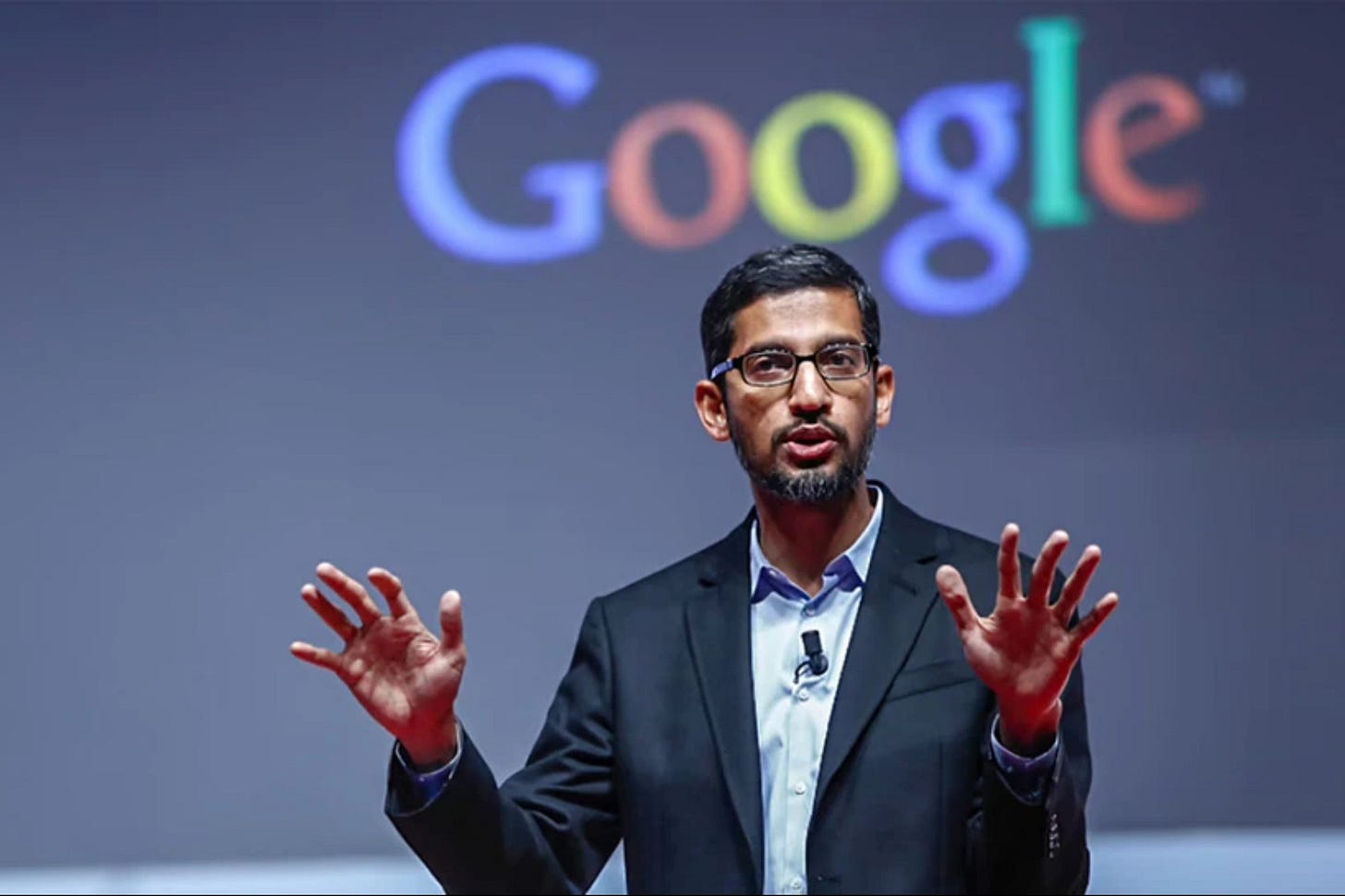Google: Executive Suite
Time to Stop Searching and Start Finding
There’s a single rule I’ve learned studying technology this last half century.
Product must be in charge.
The alternative to having product in charge is to put finance there. Lots of companies do this, maybe most of them.
Google did it nearly a decade ago. It’s wrecking them.
Finance in this case is Ruth Porat, a former Morgan Stanley banker handed the Chief Financial Officer role in 2015. As part of the shakeup, Sundar Pichai came in as CEO. The founders, Larry Page, and Sergey Brin, eventually left to enjoy their 9-figure wealth.
No one seems to have noticed the downside. Except me.
What happened was predictable. Thomas Kurian was brought in from Oracle to run Google Cloud. He built a huge fiefdom, became the face of the company. But he hasn’t moved the needle on market share. Cloud is growing, but only at the rate of the market.
Kurian isn’t Google’s only worthless princeling. Workers complain of a pervasive sense of nihilism. Exciting projects are being dumped in favor of AI. AI is producing garbage while its top scientists are moving to a start-up.
Vision From the Top of the Tower
The problem is a lack of vision, which comes from the top. If you wanted to describe Google a decade or two ago, you’d just say “search.” With the rise of AI, Google doesn’t know what to think.
Google has gotten along for a decade with a go-along, workmanlike CEO in Sundar Pichai but he’s weak, because he doesn’t know what his company is about. Meanwhile, Microsoft is the most valuable company in the world again because their CEO, Satya Nadella, can describe it in one word – cloud.
All this was explained even before I was born, in a 1954 movie called Executive Suite. The setting was manufacturing, but the point remains the same. Its finance guy, played by Fredric March, is, like Porat, running the company through the balance sheet. He brags about a tax law change doing more for the bottom line than its research. The hero, William Holden, insists the company will be “dead” if it goes down that road. He’s right.
Page and Brin could solve this problem. Fire Pichai, retire Porat, now busy destroying all the company’s innovations as “chief investment officer,” and start again. Boil what Google should be about in the 2030s into one word and concentrate everyone on that. Create a sense of crisis and toss aside those who don’t share it. Try stuff again.
If you want the one word, I have it right here. The word is find. The search engine must become the way you find out what to do, where to go, and how to get there. Stop looking for sources and start delivering authoritative, accurate answers. Follow that path and see where it goes.




I don't think Holden's speech is calling for product to lead alone. I think he agrees with you.
I don’t disagree on taking the finance wonks out .. but not sure I agree on putting product in ... I know lots of companies that lead with product .. and it doesn’t work unless there is wider purview which is often missing in product thinking. Our friends in Cupertino don’t lead with product .. though many pundits do .. they lead with vision, experience and story that the product delivers against.
The top needs to be market, future market, visionary oriented. Disciplines that used to fall under marketing ... though sadly not anymore .. as they are all chasing data and models and RoI .. but those people exist. In all of those disciplines. The dude at the top can still be a focussed finance wonk ... their skill is to listen to everyone, take advice and pay attention.
Again .. the man at the top of Cupertino is ‘operations and supply chain’ ( by history ) but to the casual observer, it’s isn’t so obvious. Meanwhile, the man before him was vision and experience and story .. sure he definitely had a say in product ... but from an holistic viewpoint.
Just one slice of the holisticism (is that even a word)... how many ‘product’ people get what good design can do.
If they do .. I mean REALLY do .. why are there so many badly designed, poorly performing products out there?